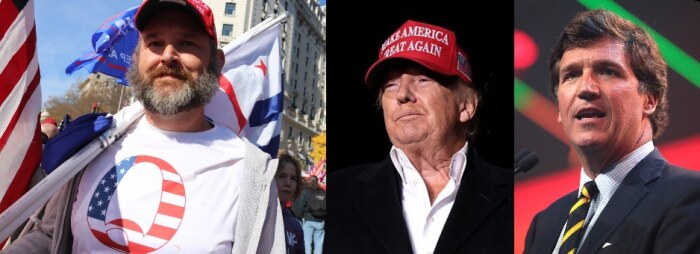Steve Corbin is emeritus professor of marketing at the University of Northern Iowa and a freelance writer who receives no remuneration, funding, or endorsement from any for-profit business, nonprofit organization, political action committee, or political party.
A lot of outlandish, hard-to-believe conspiracy theories are witnessed during one’s lifetime. Most thoughts come and go away with no residual effect. But, in today’s politically divisive times, many conspiracy theories are causing long-term damaging effects.
Many people who watched Oliver Stone’s 1991 movie “JFK” believed there was a government orchestrated conspiracy to assassinate President Kennedy. Despite the movie’s many inaccuracies, its plot was confirmation to those believers who had a predisposed anti-government attitude.
University of Miami political science professor Joseph Uscinski—considered the country’s foremost expert on conspiracy theories—contends the disinformation (deliberately deceptive) and misinformation (incorrect or misleading) statements don’t persuade people. Rather, it gives them “exactly what they already believed.”
This means people who deny the Holocaust existed are those who were seeking such a belief. Uscinski’s research suggests that people who believe in certain kinds of fringe conspiracy theories (like denying the Holocaust or the mass shooting at Sandy Hook) “have higher levels of psychopathy and narcissism.” He told Rolling Stone in 2021, “People who are sort of anti-social in their views, they’re picking out anti-social ideas to adopt. So it’s not the conspiracy theory doing things to them.”
For a book called The Dangerous Case of Donald Trump, more than three dozen psychiatrists and mental health experts assessed Trump as having an abnormal personality and chameleon-like behavior. He has pushed numerous conspiracy theories, including some that were deliberately deceptive (like saying former President Barack Obama wasn’t born in the United States).
Another classic Trump canard was believed by followers who detest wind power. In 2019, the president said of wind turbines at a Republican fundraiser, “they say the noise causes cancer.” Trump’s notion that global warming was a hoax created by the Chinese government to make America non-competitive was just the salvo needed by people who dislike China.
Trump has spread numerous conspiracy theories—at least 20 of them, and more by some counts.
The QAnon conspiracy theory alleged Democrats were Satan-worshipping pedophiles who conspired against Trump during his term of office. Uscinski’s analysis has indicated, “QAnon is driven by people who just hate the entire establishment [….] these are people who want to tear down the system because they feel alienated from it.”
The Fox News host Tucker Carlson claimed that critical race theory (CRT) was being taught in public schools, though he admitted in November 2021 that he didn’t know what CRT was. This framework is taught in some law schools or graduate-level courses but is not taught in any K-12 public school.
Carlson has also touted the so-called “great replacement theory,” which accuses Democrats or other forces of trying to replace America’s white population with people of color. As per Uscinski’s research, people who are racist, anti-Semitic and white nationalists believe in the replacement theory.
Sadly, around 3 million viewers are regularly exposed to Carlson’s conspiracy theories.
The House Select Committee’s public hearings on the January 6 events have revealed the insidious nature of Trump’s stolen-election conspiracy, which inspired 147 Congressional Republicans—obviously lacking inductive or deductive reasoning skills— to vote to reject the 2020 electoral college count. Trump’s Big Lie about the 2020 election has hoodwinked roughly 70 percent of Republicans, according to various opinion polls.
Uscinski notes the belief in conspiracy theories is not just a right-wing phenomenon. A majority of Democrats believe Russian President Vladimir Putin has compromising information about Trump. Why? Probably because they don’t like Trump.
Uscinski feels conspiracy theories are undermining democracy. His solutions include:
One, the parties need to have better control over who they allow to run under their banner. The Republican Party should not be allowing the Trumps, and the Democratic Party should not be allowing [Marianne] Williamson. If people are espousing unacceptable ideas, those people should be removed from the ballots.
Congress also needs to hold their members accountable for engaging in this sort of stuff. [Ted] Cruz and [Josh] Hawley should have been booted from the Senate for their actions. Replace them with another Republican — that’s fine. They need to hold themselves accountable before they start to censor any of us.
Candidates for the November 2022 election need to be asked, point-blank: do they believe or reject various conspiracy theories? If elected, will they promise to call out politicians of their own party who spread disinformation and/or misinformation? Their answers to these straightforward inquiries could drive responsible voting, give us honorable legislators, and save our democracy.
Top montage, from left: Photo by Elvert Barnes of a QAnon supporter marching in Washington on November 14, 2020; photo by Gage Skidmore of Donald Trump at a rally in Arizona on January 15, 2022; photo by Gage Skidmore of Tucker Carlson speaking at the 2020 Student Action Summit hosted by Turning Point USA in Florida on December 19, 2020.

